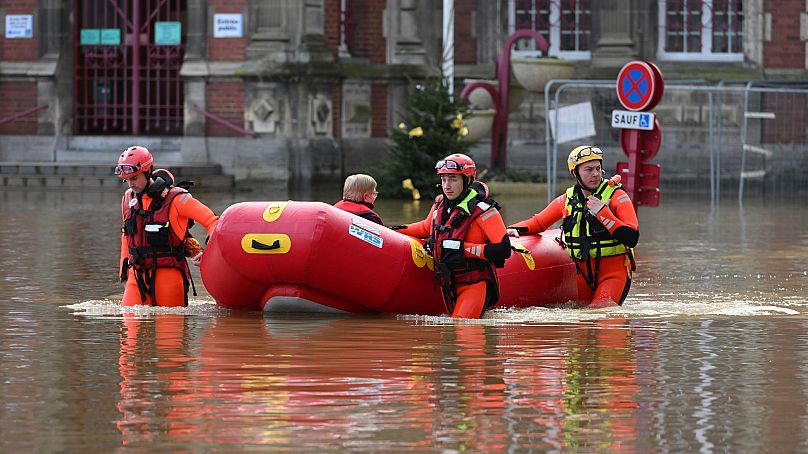El Nino, sea level rise and outdated defences have exposed European communities to devastating flooding.
Heavy rains have pummelled Germany, France and the Netherlands over the last two weeks, causing persistent flooding and even one death in France.
Towns in the north of the country were left underwater on Thursday and hundreds of people have been evacuated in recent days. The area was also hit by flooding in November and December, and some towns still hadn’t recovered.
Widespread flooding has also hit central England, and more heavy rain is forecast in southern areas. On Thursday evening, more than 220 flood warnings and almost 300 flood alerts remained in place across the country.
The flooding comes just days after Storm Henk, named by the official weather services of Britain, Ireland and the Netherlands, battered large areas of England and Wales, leaving the ground saturated and prone to flooding.
So what’s behind this perilous weather?
What’s causing heavy rainfall in Europe?
Europe’s extreme downpours are partly down to a ‘western weather’ pattern, meteorologist Fabian Ruhnau told Luxembourg TV channel RTL Today. This sees the North Atlantic jet stream flow directly into Central Europe, bringing low-pressure systems with lots of rain.
Although this in itself is not out of the ordinary, climate change is making the situation worse.
Above-average ocean temperatures - partly due to the El Nino weather pattern - are causing evaporation and therefore more rain in low-lying regions. And sea level rise is causing rivers to burst their banks more frequently.
In recent days, low-lying communities in northern France have faced power cuts, flooded streets and evacuations due to heavy rainfall. Rising sea levels have likely contributed to this: between 1957 and 2017, sea levels at Dunkirk rose by 9 cm. From 1966 to 2018, Calais saw a 4.4 cm rise.
Outdated flood defences are leaving communities underwater
Northern France’s outdated water management systems are proving no match for the dual threat of extreme weather and climate change.
Building developments along riverbanks have placed further strain on drainage, and successive storms have led to sodden soil that is unable to absorb more water.
Pumps have been brought in from around the country and from the neighbouring Netherlands to combat the flooding.
“It has rained a lot recently, which means that the water in France can no longer be drained properly,” Infrastructure and Water Minister Mark Harbers said in a statement.
“In many places, rivers have already burst their banks. That is why it is important to help each other get rid of the water as quickly as possible.”
In the UK, too, communities are at the mercy of neglected infrastructure projects. Damaged flood defences, river mismanagement and poor soil quality are making deluges worse.
Worse flooding is likely as climate change bites
As the planet heats up, rainfall is increasing.
For every 1C of warming, experts say the atmosphere is able to hold 7 per cent more water vapour. This increases the chance of heavy rainfall.
Some analysis suggests that storms are also getting more frequent and intense, resulting in heavier downpours.
With heat-trapping greenhouse gas emissions from human activity still on the rise, Europe will need improved flood defences, early warning systems and resilience measures to mitigate the fallout of heavy rain.












